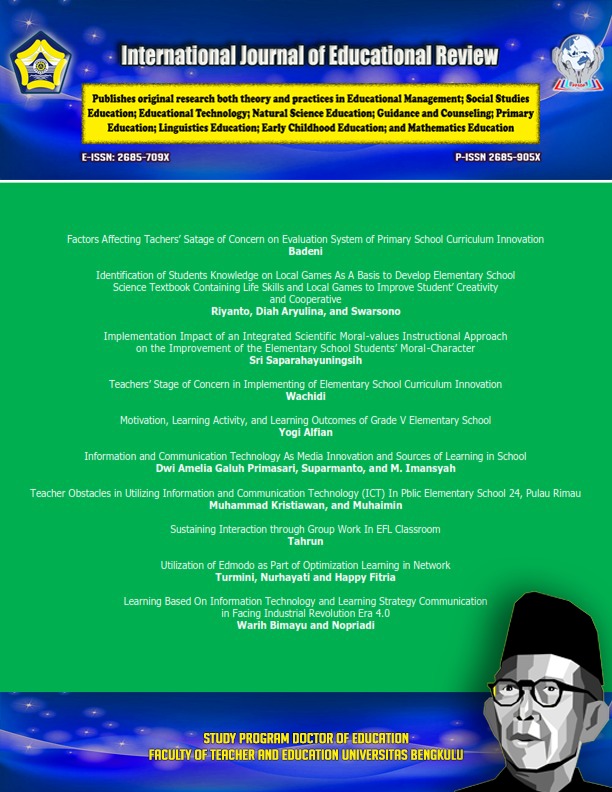The Effect of Visionary Leadership and Lecturer’s Performance on Students’ Achievements
DOI:
https://doi.org/10.33369/ijer.v2i1.10631Abstract
This study aimed at determining how high leadership style and lecturers' performance on students' achievement in STIKes Muhammadiyah Palembang. This study used a quantitative survey by using questionnaire to collect the data. The data were analyzed by using SPSS for Windows. The results obtained indicate that there is no effect of visionary leadership toward students' achievement, but there is an effect of lecturers' performance toward students' achievement. While tested simultanously, the visionary leadership style and lecturers 'performance toward students' achieved had significant effect.References
Ahmad, S. (2013). Resilience of Principal Leadership: One of the Determinants of the Principal's Success. Yogyakarta: Library of Felicha.
Agung, A. A., & Yuniar, I. (2014). Indicator Design and Implementation of Lecturer Performance Assessment in Information Systems. National Information System National Seminar, 9-15.
Andriani, S., Kesumawati, N., & Kristiawan, M. (2018). The Influence of the Transformational Leadership and Work Motivation on Teachers Performance. International Journal of Scientific & Technology Research, 7(7).
Andriansyah. (2015). Regional Head Visionary Leadership: Studies and Theories. Jakarta: Social Sciences Univ. Prof. Dr. Religious Moestopo.
Anwar, M. I. (2013). Educational administration and management costs of education. Jakarta: Rajawali Press.
Apriana, D., Kristiawan, M., & Wardiah, D. (2019). Headmaster’s Competency In Preparing Vocational School Students For Entrepreneurship. International Journal of Scientific & Technology Research, 8(8).
Archbald, D. (2013). Vision and Leadership: Problem-Based Learning as a Teaching Tool. Leadership Education, 12 (2), 136-147.
Azis, N., & et al. (2011). Analysis of the Model of the Relationship between Commitment and Position in the Performance of Lecturers through Visionary Leadership, Head of the Study Program at Muria Kudus University. 4 (2), 171-181.
Baharuddin & Mulyono. (2006). Strategic Management of Increased Performance of Lecturers of Islamic Higher Education (Case Study in UIN Malang). eL-QUDWAH, 1 (1), 1-14.
Christianingsih, E. (2011). Higher Education Quality Management (Study of Visionary Leadership and Lecturer Performance on the Quality of Private Universities in the City of Bandung). Managerial, 9 (18), 31-41.
Furkan, B., & et al. (2012). The Effects of Leadership on Job Satisfaction (Visionary Leadership, Transformational Leadership, Transactional Leadership). 3rd International Symposium on Suistainable Development. May 31-June 01 2012, 220-226.
Irfani, B. (2010). Motivation in Learning English. Analysis, 10 (1), 19-24.
Lindawati, & Salamah, I. (2012). Utilization of Information and Information Technology Systems Influence on the performance of Individual Employees. Accounting and Finance, 14 (1), 56-68.
Ministry of Education and Culture. (1990). Indonesia Dictionary. Jakarta: Balai Pustaka.
Hartono, D., & Priyanti, W. (2014). Visionary Leadership Realizes Islamic Nuance Schools Ready to Compete in the Era of Globalization. Surabaya: Islamic Boarding School Ponpes ‘Alimussirry.
Hijayati, S. S. (2015). Relationship between Lecturer Professionalism and Student Achievement at the Faculty of Engineering, Semarang State University.
Indrarini. (2009). Effect of Motivation and Job Satisfaction on the Performance of Private Academy Lecturers in Semarang City.
Irmayani, H., Wardiah, D., & Kristiawan, M. (2018). The Strategy of SD Pusri In Improving Educational Quality. International Journal of Scientific & Technology Research, 7(7).
Isnin, M. R. (2014). Analysis of Climate Effect, Competence, Organizational Culture and Work Discipline on Teacher Performance (Case Study in 159 Public Elementary Schools, 160 Public Elementary Schools and 161 Palembang Public Elementary Schools).
Kesumawati, N., & Aridanu, I. (2017). Parametric Statistics on Educational Research. Palembang: Noer Fikri Offset.
Khasanah, U., Kristiawan, M., & Tobari. (2019). The Implementation of Principals’ Academic Supervision In Improving Teachers’ Professionalism in the State Primary Schools. International Journal of Scientific & Technology Research, 8(8).
Kristiawan, M., Safitri, D., & Lestari, R. (2017). Manajemen Pendidikan [Education Management]. Yogyakarta: Deepublish.
Murtiningsih, M., Kristiawan, M., & Lian, B. (2019). The Correlation Between Supervision of Headmaster and Interpersonal Communication With Work Ethos of the Teacher. European Journal of Education Studies.
Pramudyo, A. (2010). Analysis of Factors Affecting the Performance of Public Lecturers in Kopertis Region V. JBTI, 1 (1), 1-11.
Purwanto, S. K. (2015). The Influence of Leadership on Lecturer Performance at Higher Education. Management, 19 (1), 47-58.
Renata, R., Wardiah, D., & Kristiawan, M. (2018). The Influence of Headmaster’s Supervision and Achievement Motivation on Effective Teachers. International Journal of Scientific & Technology Research, 7(4).
Sileuw, M. (2011). Educational Leadership and Efforts to Move Staff/Staff and Teachers. Jabal Wisdom, 4 (8), 219-236.
Simbolon, S. (2013). The Effect of Visionary Leadership, Motivation and Competence on Work Culture and Commitment and Its Implications on Lecturer Performance. Contingencies, 1 (2), 78-88.
Siswanti, Y., & Rahatmawati, I. (2014). The Influence of Visionary Leadership and Motivation on Organizational Performance (Study on the Giriloyo Batik Association SMEs in Bantul Regency, Yogyakarta). Sustainable Competitive Advantage (SCA), 4 (1), 74-84.
Sumardjoko, B. (2010). Determinants of Lecturer Roles in Higher Education Quality Assurance. Educational Horizons, 29 (3), 294-310.
Soemanto, W. (2002). Guidelines for Thesis Writing Techniques (Scientific Work). Jakarta: Bumi Aksara.
Sugiyono. (2015). Qualitative Quantitative Research Methods, and R & D. Bandung:
Suharsaputra, U. (2013). Education administration. Bandung: Refika Aditama.
Taruno, FX. S. C., & et al. (2012). Effect of Leadership Style on Lecturer Performance with Job Satisfaction and Work Motivation as a Mediator (Study at Private Universities in Jayapura). Management Application, 10 (3), 495-509.
Tobari. (2015). Building Organizational Culture in Government Agencies (Equipped with Results of Organizational Culture Research in the Provincial and Regency/City Governments of South Sumatra). Yoyakarta: Deepublish.
Tobari., Kristiawan, M., & Asvio, N. (2018). The Strategy of Headmaster on Upgrading Educational Quality In Asean Economic Community (AEC) Era. International Journal of Scientific & Technology Research, 7(4).
Yanita. (2012). Visionary Leadership, Motivation, and Discipline in Management ". Visionary & Strategic, 1 (1), 103-119.
Zohriah, A. (2005). Management Ability of Principals in Improving Teacher Performance. ALQALAM, 22 (2), 214-244.
Zuhdi, M. H. (2014). The Concept of Leadership in the Islamic Perspective. Akademika, 19 (1), 35-57.
Downloads
Published
How to Cite
Issue
Section
License

This work is licensed under a Creative Commons Attribution-ShareAlike 4.0 International License.




